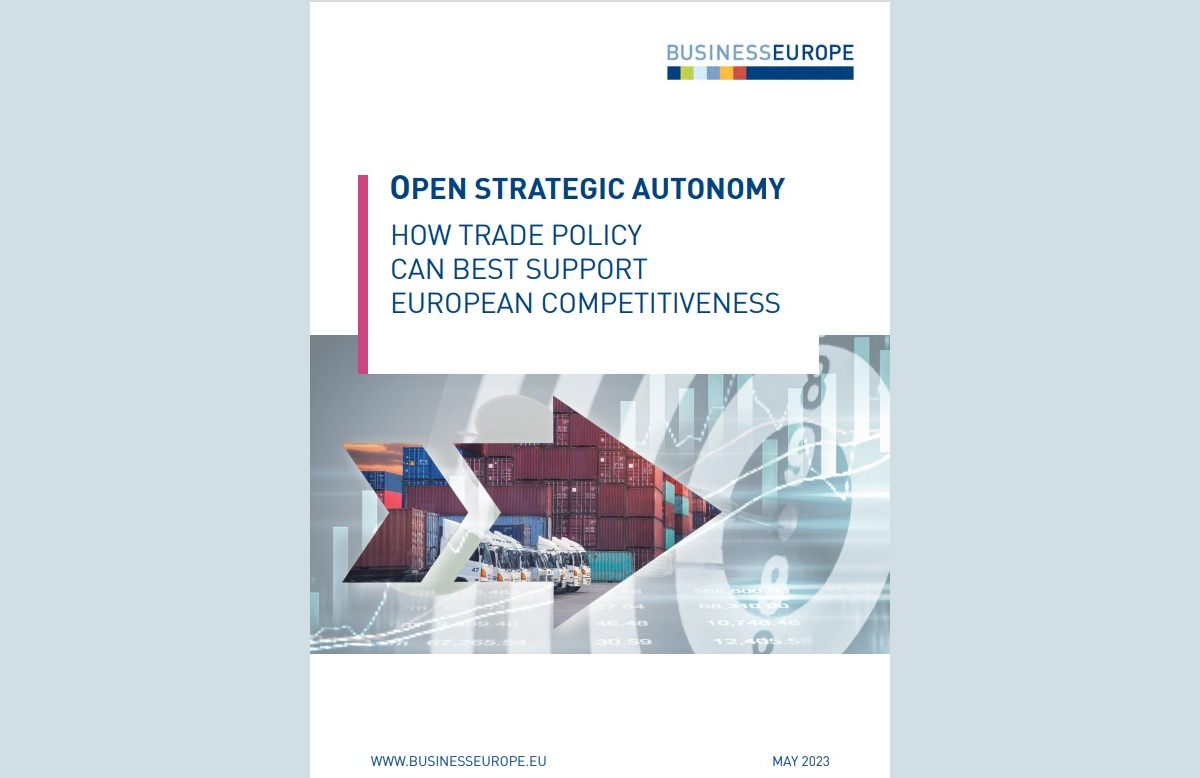Today, BusinessEurope publishes its new paper “Open Strategic Autonomy – How trade policy can best support European competitiveness”. It addresses some of the most important geopolitical and competitiveness challenges that European companies are facing: mitigating risk and increasing resilience in supply chains, creating new market opportunities, promoting more sustainable standards globally, respecting the rules-based order and ensuring a level playing field.
BusinessEurope Director General Markus J. Beyrer said:
“We need to make Europe more competitive, more attractive for investments. An ambitious and dynamic trade policy is fundamental to retain competitiveness in Europe and to make Europe stronger in the world. To mitigate geopolitical risks and make our supply chains more resilient we need to diversify our imports, we must open new markets through the ratification and effective implementation of trade agreements.
Economic security is a concern, but new measures need to be carefully assessed to avoid a negative impact on Europe’s competitiveness. We support increasing coordination and exchange of information on export controls at European and international levels. We call for caution regarding limitations on outbound investment. If considered, only in exceptional cases where serious security concerns are effectively proven as a last resort measure and thoroughly discussed with business.”
Key messages
- Trade policy for decades has played a key role in supporting the EU’s competitiveness and in influencing investment decisions in Europe. We should renew our commitment to trade policy to complement and underpin other important EU policies on climate, digital, innovation and industrial policy by achieving the following objectives: increasing resilience through diversification of imports; creating market opportunities for European companies; improving security and mitigating geopolitical risks; promoting more sustainable standards and ensuring a level playing field. In a similar vein, other EU policies should also consider their impact on trade. Action is also critical at global level and the EU should work with its trading partners to renew a shared commitment to rules-based trade order to effectively address the challenges we face today.
- There cannot be strategic autonomy without openness. The EU should continue to pursue a positive trade agenda that aims at increasing market access in third countries. The EU trade agreements with New Zealand, Chile, Mexico, and Mercosur should enter into force during this institutional cycle, while ongoing negotiations with Australia, India, and ASEAN countries must accelerate and possibly be concluded. Greater focus should be placed to ensure effective implementation of agreements already in force, including a better take-up and use of these agreements by businesses. Existing trade agreements should remain effective and stand the test of time through continuous work to meet the challenges of decarbonising and digitalising the economy and to ensure trade barriers do not arise in the future. The EU should urgently work to reduce the costs of doing business with the US and ensure a balanced relationship with China that takes into account the increasing risks while remaining engaged.
- The EU should assess the impact on competitiveness before introducing additional export restrictions on certain goods and critical technologies. Export restrictions should be adopted on a case-by-case basis. Coordination across member states and key international allies should be ensured, as well as consultation with the private sector, to avoid fragmentation and ensure legal certainty for companies. The EU must define ways to increase European and international coordination and exchange of information on export controls in order to avoid not only market fragmentation, but also trade diversion and potential competitive advantages for those countries adopting less stringent measures. The legal framework for screening of Foreign Direct Investment can be a good benchmark in this regard.
- In view of the current geopolitical context, the EU should join or promote informal alliances open for other countries that are equally committed and share the objectives, on issues where global rules development is not possible. The EU’s informal alliances should be open to developing countries, where the focus on higher standards would go hand in hand with capacity building support and financial schemes that could facilitate countries to achieve the Sustainable Development Goals.
- The EU should carry out an assessment of the investment screening mechanisms at EU and national level before considering adopting stricter conditions to screen inbound foreign direct investment. The instruments already in place should be given time to be thoroughly applied and tested before new control mechanisms are proposed, particularly to avoid further burdening EU businesses with additional reporting requirements. Furthermore, BusinessEurope does not support by principle introducing limitations on outbound investment. Only in exceptional cases where serious security concerns are effectively proven this could be a last resort measure. The private sector should be consulted to ensure that the measures adopted are effective whilst fully preserving the EU’s global competitiveness.
- The EU should continue promoting sustainability objectives by connecting market liberalisation to the fulfilment of certain sustainability criteria, or through the introduction of “minimum sustainability standards” based on measurable, transparent and well-established international conventions, to be fulfilled by trading partners during negotiations, such as the Paris Agreement and the fundamental ILO Conventions.
- The EU should continue to fully support the multilateral rules-based system, while making use of the flexibilities provided for under WTO rules where appropriate and on a case-by-case basis. The EU should not exclude a priori non-MFN plurilateral arrangements in key areas, e.g., those related to sustainability or state subsidies, where results are not achievable within the WTO framework and companies competing globally cannot count on a level playing field.
- The EU should support Europe’s innovation-driven economy by a) promoting effective protection of intellectual property both bilaterally and multilaterally and b) adopting ambitious digital trade policies that promote the legitimate and secure movement of data across borders as well as address digital protectionism, including through bilateral agreements. In addition, the moratorium on customs duties on electronic transmissions should be made permanent at the WTO ministerial planned to take place in 2024.
Read our position paper here.






